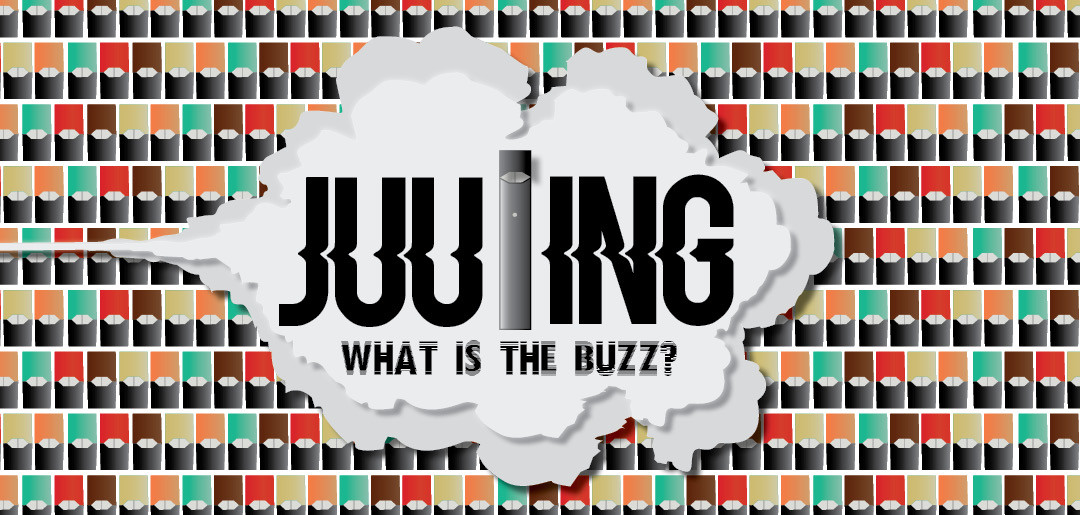Holly Santero, Senior Editor
@santerocourant
Sam Stoner, Editor-in-Chief
@sstonercourant
Before asking NCHS senior Jon* about his thoughts on juuling, he took out what looked like a small, handheld flash drive and took a long, deep breath. Blowing out the smoke, then inhaling it through his nose in a popular trick known as the “French Inhale,” he was ready to start the interview.
Over the past few years, NCHS has seen a variety of changes in the types of activities students do “under the table.” Whether it’s visible or not, there has always been a small group of students who participate in illicit activities in and out of school. However, due to the introduction of the Juul, that small group of students has expanded into a much larger and more diverse community.
The Juul is a small, black, electronic cigarette that takes the shape of an elongated flash drive. All that is needed to use one is a simple USB charger and a small pod of nicotine. You choose the flavor. So small that it can fool adults into thinking it is a flash drive, and so tasteful that the user becomes unaware that he or she is inhaling a pack of cigarettes with each flavor-packed pod they finish, the Juul has become as popular as it is controversial.
Health professionals such as school nurse Janet Reed urge students to take into consideration the damage that nicotine can have on a healthy, developing body. “Your blood vessels, which are where your blood travels through, are supposed to be as smooth as the inside of your mouth, but nicotine causes those blood vessels to become rough which is what causes a blood clot,” Ms. Reed said. “A blood clot that goes to your brain causes a stroke, a blood clot that goes to your heart causes a heart attack, and a blood clot that goes to your lung leads to a pulmonary embolism. All of these clots can kill someone.”
Jon*, who is aware of the many health risks associated with juuling and has decided to quit, believes that the appealing flavors are what causes teenagers to look past the dangerous and addictive trend. “I think the pod flavors definitely cause younger people to start juuling,” he said. “They have such an appealing taste and smell, and not many kids want to taste tobacco when they’re [smoking].”
Senior Taylor* began juuling because it was a new trend and she thought of it as a good alternative to alcohol at parties. “I started juuling over the summer because it was this new fad that everyone was really into,” she said. “It is a good pastime when you’re bored or if you’re ‘DDing’ (designated driver) because you can still get a buzz instead of drinking.”
Unlike other students, senior Mary* thinks that juuling is a superficial hobby with consequences that outweigh the rewards. “I don’t juul because I know that it is bad for you and it is not worth doing just to look cool,” she said. “Most people try it because their friends are doing it, and they think it looks fun or cool, but the problem is that they end up getting addicted.”
Jon* believes that social media accounts such as @Juulboyz and @Juulbabez, which depict juulers from places all over the country including in Fairfield County and many college campuses, have also contributed to the surge of Juul users at NCHS. “Accounts like [Juulboyz and Juulbabez] on Instagram have affected the rise in juuling,” because, “they make the people juuling look really cool, and that’s obviously going to encourage kids to try and look the same way,” Jon* said.
Principal Bill Egan has noticed the effects of social media’s promotion of the Juul, and has taken action in order to combat the sudden increase in users in school. “We have seen a rise in school and in the number of incidents in vaping,” he said. “I have seen it in the bathrooms, in class, and to me that’s crazy. What we have done to try and prevent it is everyday I send our security guards, our police officer, and teachers into the bathroom to check in.”
In light of the hearing about the disciplinary consequences of juuling in school, some students decided to save their habit for off-campus use only. However, despite knowing about recent incidents resulting in in-school suspensions, sophomore Steve* believes juuling is still not very risky. “I was more cautious about it [after learning about the in-school suspensions],” Steve* said. “Instead of doing it right where the urinals are, I walk into a stall, but that’s about all the cautionary action I take. It is also pretty rare for a teacher to come in.”
While the news of teachers and other faculty checking in on student bathrooms has spread, Principal Egan knows that juuling hasn’t gone away. “We have seen it decline, and that doesn’t mean it is still not happening at all, but is certainly has declined from where it was,” he said. “I think that like anything else that is new, it gets a little spike and then it will go away.”
Even though juuling has become a popular trend that many people are on board with, many students have issues with it. Senior Olivia* also juuls during school and recognizes that it is a bad habit. “I usually get up to go to the bathroom at least once every class, I will go during a test sometimes too,” Olivia* said. “I don’t really love [juuling], but at this point, it is a horrible habit I have and it is an urge. It is part of my routine, but at the same time I wish I wasn’t doing it.”
Mary*, who does not juul, is upset by students who don’t obey the rules, and think that the punishment of a five-day suspension is warranted. “When people use their juuls during school, it is really bothersome,” she said. “I have seen people juuling in the cafeteria, in the library, and I’ve even seen people do it when my teacher is turned around in math class. I think that the five day suspension is effective and should encourage kids not to do it.”
Despite knowing the harm that juuls can cause, some students think that it comes with positive aspects depending on the user’s past. For Olivia*, it was a healthier and more socially acceptable option. “I used to smoke cigarettes which was a horrible habit that my friends didn’t know I had, and so I figured juuling would be better,” she said.
For others students like Taylor*, juuling provides a psychological remedy at the expense of physical health. “When I am stressed sometimes, I just hit my Juul, and after one or two puffs, I feel that my stress is definitely reduced,” she said. “If I am ever stressed about school, I will juul, and if I am trying to go to bed, I will juul and that will work too.”
For students like Olivia* and Taylor* who have turned to juuling to ease their stress, Ms. Reed urges them to consider finding other less harmful ways to deal with it. “Students might not know that the formaldehyde that’s inside these Juul cartridges is poison, and when you’re inhaling these vapors, you’re sending poison all over your body and to your brain,” she said. “Your whole life is going to be stressful, no matter what age you are, but putting these chemicals in your body is the worst thing to manage your stress. Students should try deep breathing, going on a walk, talking to a friend, or even just drinking a glass of water instead.”
Like Ms. Reed, Principal Egan believes that the best thing for students to do is avoid juuling, and encourages them to think about how it could be affecting their academic success and life in general. “There is a direct correlation between trying foreign substances and your grades declining,” he said. “We try and make this as positive and welcoming an environment as we can, constantly trying to build culture and give new things to students. I would say don’t do anything that jeopardizes your day-to-day academics and overall life here at New Canaan High School.”
*Name has been changed




